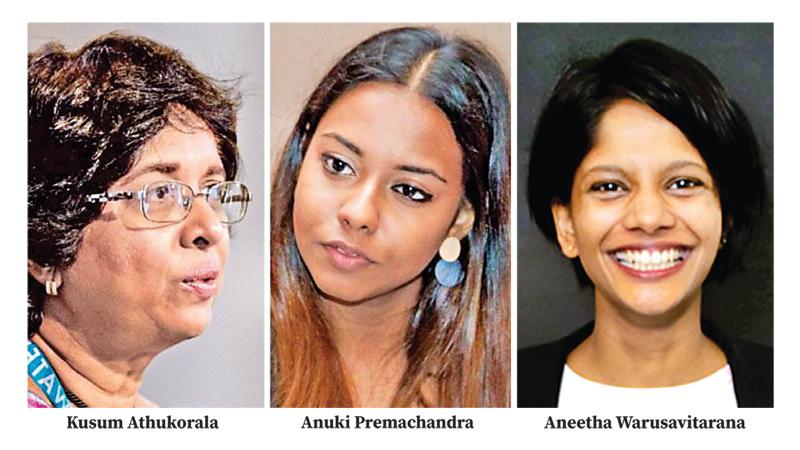
The decision of the Government to provide free sanitary napkins to schoolgirls amid the looming pandemic has captured the attention of the country. Enhancing accessibility of Sri Lankan women to menstrual hygiene products has been a hot topic for many years.
Research conducted by the Ministry of Education revealed that about 1.2 million schoolgirls do not attend school during menstruation due to less accessibility and affordability of sanitary napkins. Prime Minister Mahinda Rajapaksa and Minister of Education Professor G.L. Peiris decided to embark on the initiative to provide free sanitary napkins to schoolgirls free. Opposition Leader Sajith Premadasa too commended the move.
Anuki Premachandra, a social activist commended the move.
“I am pleased with the decision to support schoolgirls to address the issue of ‘period poverty’. The Government also stated that it would improve sanitation and disposal facilities as well”, she said.
Senior Advisor to the Sri Lanka Water Partnership, Kusum Athukorala who has vast experience on the ‘menstrual hygiene’ by closely working with underprivilege communities and particularly with schools in rural areas proposed a coupon-based system to carry out the program.
“As we have experienced disorders in the process of this kind of activities, I think the best would be to give away a voucher to buy asanitary napkin pack from school shops,” she said.
Thereby girls will be able to purchase a product which is more comfortable. “If there is only one company to provide sanitary products it could lead to fraud,” Athukorala said.
Anuki, a strategic communications manager said the discussion on menstrual hygiene paves the way for a broader discussion on sexual and reproductive health.
She added, “My preference is to give women the choice when it comes menstrual hygiene products enabling them to choose what they prefer and what suits their body and lifestyle best. Giving the choice will ensure that women of different socio-economic groups have better access to product”.
Holistic approach
While, only 30 percent of Sri Lankan women have access to menstrual products such as sanitary pads and tampons, Research Manager at Advocata Institute in Colombo, Aneetha Warusavitarana also stressed the need for a holistic approach to solve menstrual hygiene issues.
“There are surveys that show that school girls miss out education because of this. But now we can assume that this issue has been addressed with the government providing free sanitary napkins.
However, the problem remains as only 800,000 girls are benefitted by the initiative whereas there are about 5.7 million Sri Lankan women needing access to menstrual hygiene products”, she said.
Advocata has been in the forefront of lobbying successive governments and other key stakeholders to slash or remove the tax on menstrual hygiene products.
Taxation
Women accounted for around 56 percent of the population in Sri Lanka as per the 2011 census. However, until September 2018, the tax on sanitary napkins was high (101.2%) hindering access to menstrual hygiene products. Currently, the tax is at around 52.6 percent.
According to the latest data by the Department of Statistics, the monthly average household expenditure on meat consumption is 4.8 percent. The monthly average expenditure on education is 5.8 percent. Borgen project, a non-profit organisation said that Sri Lankan woman’s monthly average expenditure on purchasing menstrual hygiene products is also four percent considering the minimum monthly salary of the country (Rs 10,000).
“I think the government should give priority to provide the facility to half of the population. Local manufacturers import raw materials for domestic production of sanitary napkins. Therefore, the tax affects all,” Warusavitarana said.
Sri Lanka still has a long way to go in raising awareness on menstrual hygiene. Unfortunately, menstrual hygiene and, related products are not openly spoken of in society which a clear indicator of the lack of awareness on menstrual hygiene that leads to insensitivity to ‘period poverty’ which ultimately prevents women from reaching their fullest potential.
“Overcoming the taboo is tough. But by talking about it we are paving the path for people to have a broader conversation,” Anuki Premachandra said.
****
Hygiene and taxation
Kenya was the first country to abolish tax on menstrual hygiene products in 2004, while after an 18-year long campaign, the 10 per cent tax on tampons and pads was lifted in Australia after states and territories agreed to make sanitary products exempt from the GST (Goods and Services Tax). Canada lifted its tampon tax in mid-2015 following an online petition.
India also eliminated its 12 percent tax on feminine hygiene products in 2017. Bollywood Superstar Akshay Kumar featured as the lead male actor in the Pad Man movie a true story inspired by the work of Arunachalam Muruganantham in Southern India. Thanks to the heart touching movie, “Mother strong, Sister strong and Woman strong; Country strong” Muruganantham’s powerful words were echoed across the world.
